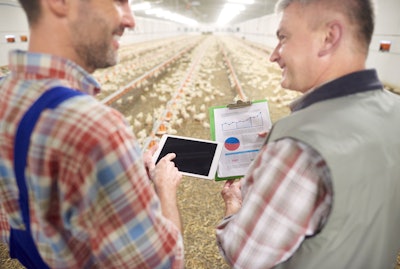
Ensuring that training programs at poultry facilities and processing plants are offered in several languages can help reduce worker turnover and improve overall farm management.
Sixty-two percent of U.S. farmworkers are more comfortable speaking Spanish, with 29% of farmworkers reporting they could not speak English at all and 40% reporting they could not read English, according to the U.S. Department of Labor’s National Agricultural Workers Survey.
Bilingual training boosts worker understanding
Training programs are crucial for any worker in the poultry industry, which suffers from high worker turnover, but native Spanish speakers may struggle more if training is presented only in English and will fail to understand complex agricultural terms, which can directly impact bird performance.
“Flock supervisors and vaccination crews are on the front lines supporting bird health,” Fernando Ruiz-Jimenez, DVM, DACPV, technical services veterinarian, Zoetis, said. “They cannot communicate as effectively to management or the veterinary team if they don’t understand what they need to be looking for.”
Providing bilingual training boosts worker confidence in their knowledge of poultry operations, resulting in better compliance with on-farm protocols. It also ensures that workers feel comfortable asking questions and helps build trust.
For example, when Hispanic workers on a large poultry farm were struggling with the concept of euthanasia, Ruiz-Jimenez stepped in with explanations in both English and Spanish. The company recorded the training for use in the future.
Small details matter when it comes to bilingual training. It’s not enough to run current training documents through Google Translate, he added.
Language barriers lead to confusion
Language barriers can cause confusion when it comes to knowing what to do on the farm.
“Workers are practicing biosecurity day in and day out. If they don’t understand why it is important, how can you expect them to follow protocol,” said Ruiz-Jimenez
Confusion can also be demoralizing for some workers when instead they should be motivated and energetic. Effective training should be personalized, comfortable and avoid pressure, fostering trust and open communication, Ruiz-Jimenez said.
“You should really make an effort to help them understand how important their jobs are because they sometimes don’t realize how critical their role within a company is,” he added



















